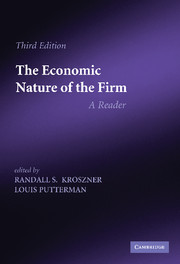Book contents
- Frontmatter
- Contents
- Editors' preface
- Reintroducing The Economic Nature of the Firm
- Part I Within and among firms: the division of labor
- 1 From The Wealth of Nations
- 2 From Capital
- 3 From Risk, Uncertainty, and Profit
- 4 From The Modern Corporation and Private Property
- 5 The use of knowledge in society
- 6 Corporate governance
- Part II The scope of the firm
- Part III The employment relation, the human factor, and internal organization
- Part IV Finance and the control of the firm
- References
2 - From Capital
Published online by Cambridge University Press: 05 June 2014
- Frontmatter
- Contents
- Editors' preface
- Reintroducing The Economic Nature of the Firm
- Part I Within and among firms: the division of labor
- 1 From The Wealth of Nations
- 2 From Capital
- 3 From Risk, Uncertainty, and Profit
- 4 From The Modern Corporation and Private Property
- 5 The use of knowledge in society
- 6 Corporate governance
- Part II The scope of the firm
- Part III The employment relation, the human factor, and internal organization
- Part IV Finance and the control of the firm
- References
Summary
The buying and selling of labour-power
(From chapters 5 and 6)
We have shown that surplus-value cannot be created by circulation, and, therefore, that in its formation, something must take place in the background, which is not apparent in the circulation itself.
The consumption of labour-power is completed, as in the case of every other commodity, outside the limits of the market or of the sphere of circulation. Accompanied by Mr. Moneybags and by the possessor of labour-power, we therefore take leave for a time of this noisy sphere, where everything takes place on the surface and in view of all men, and follow them both into the hidden abode of production, on whose threshold there stares us in the face “No admittance except on business.” Here we shall see, not only how capital produces, but how capital is produced. We shall at last force the secret of profit making.
This sphere that we are deserting, within whose boundaries the sale and purchase of labour-power goes on, is in fact a very Eden of the innate rights of man. There alone rule Freedom, Equality, Property, and Bentham. Freedom, because both buyer and seller of a commodity, say of labour-power, are constrained only by their own free will. They contract as free agents, and the agreement they come to is but the form in which they give legal expression to their common will.
- Type
- Chapter
- Information
- The Economic Nature of the FirmA Reader, pp. 46 - 51Publisher: Cambridge University PressPrint publication year: 2009
- 3
- Cited by



